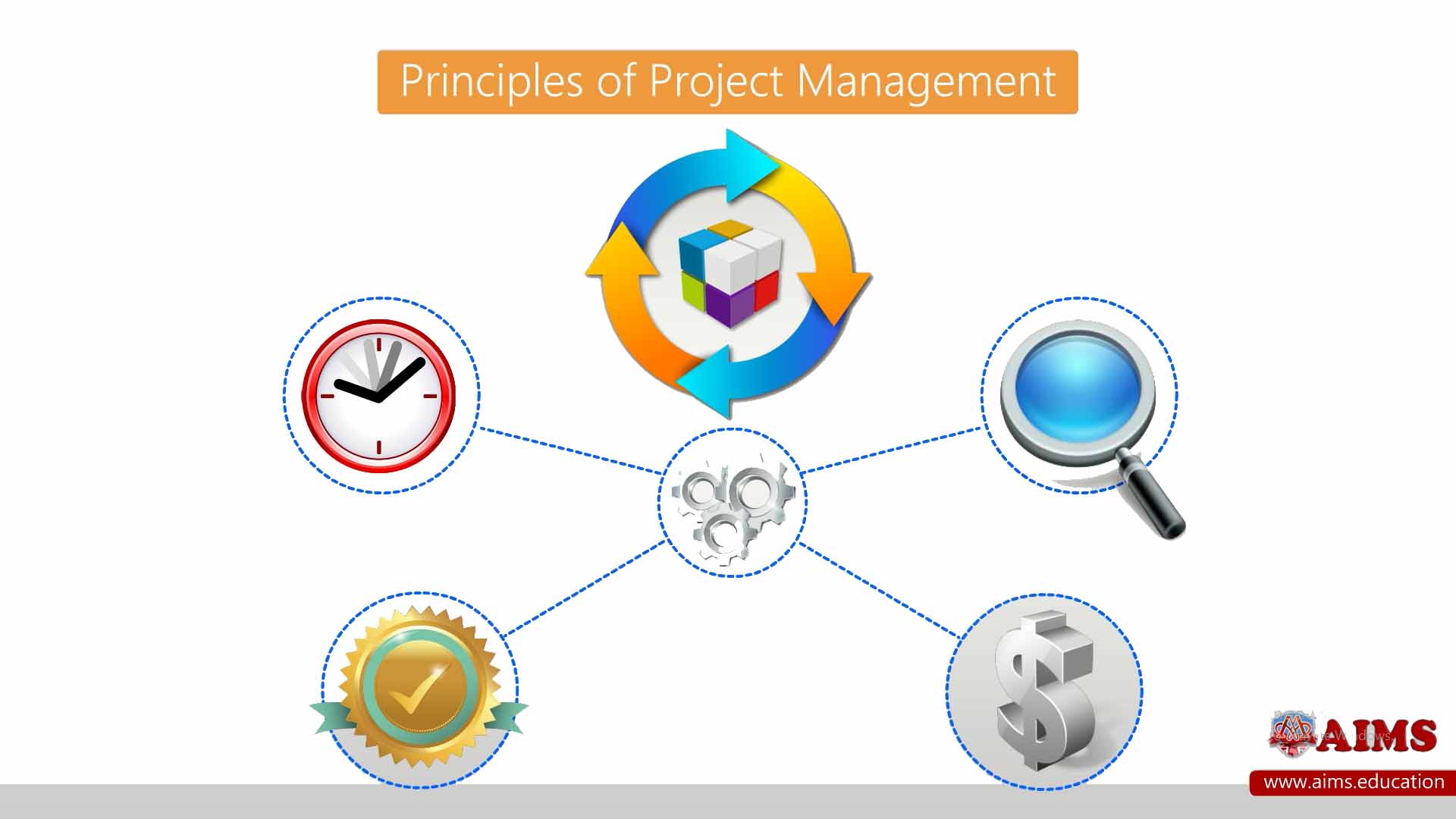Project Management Principles
The biggest challenge in project management is to make sure that all goals and objectives of the project are achieved while taking into consideration the pre-defined constraints. Project management principles are fundamental guidelines that help ensure the successful execution and completion of projects. These principles of project management include clear objective setting, and maintaining precise communication among stakeholders. Efficient resource management ensures that all necessary resources, such as time, budget, and personnel, are optimally allocated and utilized. Let us understand the 15 basic project management principles that collectively contribute to the systematic and organized approach required to achieve project goals efficiently.

You may learn these principles as well as the implementation of project management (using both agile and waterfall methodologies) during online courses with certificates in Project Management and the best online MBA in Project Management program.
15 Basic Principles of Project Management
There are essentially 7 project management principles that you should know about.
1. Focus on Products
The client or the customer for whom the project has been developed should have a clear idea of what they require and how they want the deliverables to be. They should be realistic about their expectations. When the client is clear about what they want or expect from the project, things become a lot easier for the managers in charge.
2. Continued Business Justification
There has to be a business justification behind every project. All projects should provide the company with a decent return on investment which makes it worth the effort, time, and investment that goes into it. There are occasions when the circumstances in the industry or in the market change during the life cycle of the project, which affects the return on investment. A decision has to be taken at such a time, as whether to continue with the project or not.
4. Manage by Exception
The sponsor of the project or the owner of the company should not be too concerned with the tiny details and they should not try to micro-manage everything. They should let the managers take charge and make the decisions within a set of pre-decided constraints. Only when the problem or issue becomes critical should it be escalated to the sponsor.
5. Manage by Stages
The project should be broken down into smaller sub-projects or stages. At the end of each stage, the sponsor of the project makes a critical decision on how to proceed further. The idea is to commit to just one stage at a time.
6. Learn from Experience
It is among the important project management principles that the manager and those involved with the project should not repeat the same mistakes every time. They should analyze what went wrong with the previous projects they worked on and learn from the lessons while planning the next project. They must not repeat past errors.
7. Tailor to the Environment
Any project management framework or methodology should be based on the specific requirements of the project. The project should be customized accordingly. Managers should never follow a methodology without considering the environment that they are operating in and the type and amount of work required. For example, a project with a time frame of 1 year should be based on a different methodology compared to one required to be done in 3 weeks.

8. Focus on Deliverables
The primary aim of project management should be the successful delivery of the project’s objectives. This involves clearly defining deliverables at the start and ensuring that all activities are aligned towards achieving these end goals. Regular reviews and checkpoints should be in place to assess progress against deliverables.
9. Define Roles and Responsibilities
Clarity in project manager roles and responsibilities and other team members is critical for the smooth functioning of a project. Each team member should know their specific tasks and how they contribute to the overall project. This ensures accountability and helps in avoiding confusion and overlap of tasks.
10. Risk Management
Identifying, analyzing, and mitigating risks during project management is essential. By proactively managing potential risks, project managers can minimize their impact on the project. Regular risk assessments and contingency planning should be integral parts of the project lifecycle.
11. Stakeholder Engagement
Engaging stakeholders throughout the project is crucial for its success. This includes regular communication, understanding their needs and expectations, and managing their involvement. Keeping stakeholders informed and engaged helps in gaining their support and aligns the project’s objectives with their interests.
12. Continuous Improvement
Project management should always seek to improve processes, methodologies, and outcomes. This involves regularly gathering feedback, analyzing performance, and making adjustments to enhance efficiency and effectiveness. Continuous improvement helps in maintaining the relevance and competitiveness of project management practices.
13. Maintain a Business Focus
Projects should always be aligned with the strategic goals of the business. This principle ensures that the project contributes to the overall success and growth of the organization. Decision-making should be based on the business value and benefits that the project will deliver.
14. Integrated Planning
Comprehensive planning that integrates all aspects of the project is essential. This includes scope, time, cost, quality, and resources. An integrated plan ensures that all elements of the project are considered and managed coherently.
15. Foster Team Collaboration
Successful projects depend on the collaboration and cohesion of the team. Encouraging open communication, mutual respect, and teamwork enhances productivity and morale. Collaborative environments lead to better problem-solving and innovation, driving project success.

Final Words
These are the 15 project management principles that every organization should incorporate into their processes. essential for the success of any project. Project management isn’t easy. It takes a lot of hard work, dedication, and commitment. You’ll need to be disciplined both in your personal life and your professional life. When you’re starting in project management, it can be difficult to know where to start. Follow the 7 principles and you’ll have a successful project.
